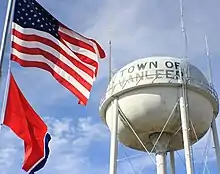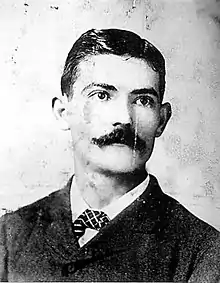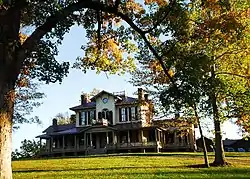Anthony Wayne Van Leer
Anthony Wayne Van Leer (a.k.a. Anthony Van Leer) (1783–1864) was a prominent Iron works owner in Tennessee, son of revolutionary officer Samuel Van Leer and nephew of General Anthony Wayne. The town of VanLeer, Tennessee is named after him.[1]

Anthony Wayne Van Leer | |
|---|---|
 | |
| Born | April 6, 1783 |
| Died | July 9, 1863 |
| Occupation | Ironmaster, Entrepreneur |
| Parent(s) | Samuel Van Leer Hannah Wayne |
| Relatives | Anthony Wayne (Uncle) Bernardhus Van Leer (grandfather) Isaac Van Leer (brother) VanLeer Polk (grandson) George Howard Earle Jr. (grandnephew) Florence Van Leer Earle Coates (grandniece) |
Biography
Anthony Van Leer was born in Pennsylvania on April 6, 1783 and named after his uncle Anthony Wayne. His father, Captain Samuel Van Leer was a well known Pennsylvania Ironmaster and a United States Army officer. All of his brothers were in the Iron trade when Anthony moved to Nashville.[2] In the mid 1800s, Anthony purchased one of the more prominent iron furnaces from Montgomery Bell who was known as the "Iron Master of Middle Tennessee."[3] For years Nashville was considered one of the wealthiest southern capitals and a large portion of its prominence was from the iron business. Nashville led the south for iron production. Van Leer would eventually become one of the state's wealthiest capitalists and industrialists. [4] His granddaughter married a Union Captain and built the historical Drouillard House on his property. His mansion was also used as a Union headquarters.[5]

Van Leer's family and history[6] is also part of historical tour for the Van Leer Cabin[7][8] and his family's home Van Leer Pleasant Hill Plantation. His family was considered one of the more well known families in the iron business at the time and noted in the anti-slavery cause. [9] Another Van Leer Cabin was used as a station for the Underground Railroad.[10] Stations like these formed a network of secret routes and safe houses established in the United States during the early to mid-19th century, and used by enslaved African-Americans to escape into free states. [11]
His descendants and relatives would go on to play various notable roles in American history.
Relatives:
- VanLeer Polk, American politician from Tennessee (grandson)[12]
- Antoinette Van Leer Polk, American Southern belle and Baroness de Charette
- George Howard Earle Jr., a Philadelphia lawyer and "financial diplomat" who was highly sought after to save ailing corporations from financial ruin
- Florence Van Leer Earle Coates, American poet and daughter of George Hussey Earle, an abolitionist who represented many fugitive slaves and a founder of the Republican party
- Isaac Van Leer, an iron works owner in Pennsylvania
See also
References
- "A Brief History of Vanleer Archived 2013-09-02 at the Wayback Machine," Dickson County Historical and Genealogical Society website, originally published in Heritage Book of Dickson County, 1803-2006. Retrieved: 28 February 2013.
- "Samuel van Leer welcomed the Revolution with enthusiasm".
- Dalton, Robert E. (Spring 1976). "Montgomery Bell and the Narrows of Harpeth". Tennessee Historical Quarterly. 35 (1): 3–28. JSTOR 42623550.
- "Iron Industry". Retrieved March 17, 2020.
- "Anthony Van Leer's House a Union Headquarters".
- Jordan, John Woolf (1962). "Mother's an Engineer". Historical Society of Pennsylvania. pp. 1322–1325. ISBN 9780806352398.
- "Dating the Van Leer Cabin".
- "Valley Forge Historical Society". 1962.
- Smith Futhey, J. (2007). "History of Chester County, Pennsylvania, Biographies". History of Chester County, Pennsylvania, Biographies. pp. 687–688. ISBN 9780788443879.
- "Historical Sites, Mortonson-Schorn Log Cabin". Gloucester County, New Jersey. Retrieved 2020-02-24.
- Cross, L.D. (2010). The Underground Railroad: The long journey to freedom in Canada. Toronto, ON: James Lorimer Limited, Publishers. ISBN 978-1-55277-581-3.
- Connie L. Lester, Up from the Mudsills of Hell: The Farmers' Alliance, Populism, and Progressive Agriculture in Tennessee, 1870-1915, University of Georgia Press, 2006, p. 172